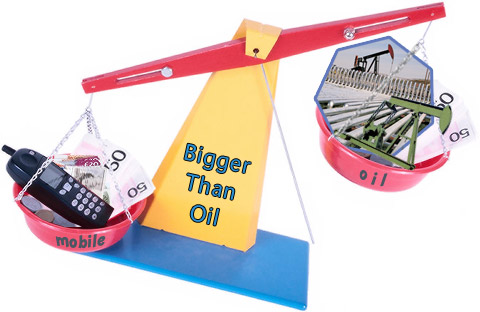A Cambridge perspective
on the digital world



July 2003
The first digital portable phone was demonstrated to the public in 1987 -
proving that mobiles could be low cost consumer items, not just expensive
business tools, and setting the industry on an unstoppable growth path. Just
fifteen years later, that growth has put mobile phones in the hands of one
in six of the world's population - probably the fastest spread of any technology
in human history, and one that makes the personal computer look sluggish.
If Yankee Group's figures are correct, more than a quarter of the world's
population will have a mobile phone, well before the end of the decade.
This astonishing growth is turning basic economic assumptions on their head, and changing the way we all live and work.
Yankee Group's figures put the mobile industry in perspective. Oil dominated the economy of the twentieth century. Its energy made people less dependent on physical labour, and enabled mass travel, by car and plane.
A century later it is information that travels, many times faster and farther than people, and it allows people to do many of the things they want, wherever they happen to be - and without having to travel, though old habits die hard. Digital information, in all its forms, is defining the shape of the twenty-first century economy, and its leading edge, surprisingly, is not the computer but the mobile phone. Before the first decade of the new century is out, the raw economic data will ram the point home.
Mobile phone revenues are already some two and a half times the value of personal computer shipments. PCs are high value items, but they are one off purchases, and replacement cycles are lengthening as the industry matures. Meanwhile as devices get smaller and sleeker, their ticket price inevitably falls. Mobiles keep on earning money for operators, month after month - however small they are.
The telecommunications industry has always been dominated by wired communications, with mobile an impertinent upstart. But no more. According to figures from the International Telecommunications Union, this year the number of global mobile subscribers will exceed the number of main telephone lines (something that has already happened in many countries, including the UK). Projections indicate that next year mobile revenues will outstrip wired phones. Wired revenues are static or declining; mobile revenues continue to grow at some 14% per annum. Revenues from mobile data - mainly text messaging - are growing even faster.
Mobile phones are digital devices, with more computing power 'under the bonnet' than the first personal computers, and they connect together in a vast digital network that makes the Internet look small. Computers are cold, impersonal and bureaucratic; mobiles are hot, emotional and intimate. They cannot afford to keep you waiting, or they will end up in the bin. They have to look good, or they will stay on the shelves. And people carry them everywhere.
These remarkable combinations of computer chips, radio engineering, low cost mass production, ergonomic design and fashion have become part of our lives, and look like becoming even more embedded in the way we all live and work. No other product brings together so many of the complex strands of twenty-first century life, from sex to silicon chips. Mobile phones link us to the rest of the world, in all its complexity, wherever and whenever we are.
The figures demonstrate where the economy is heading, and what we value. We used to pay for physical commodities (such as oil), and manufactured goods. Now we pay for services, such as the ability to communicate. Products and commodities may be needed to deliver this, but like mobile handsets, they may be given away to those who pay for the service.
No matter what area of life you look at, mobiles are there; and they are changing the way things are done.
Take one example: mobiles are making the conventional office - a place where people used to sit at serried ranks of desks and work on pieces of paper - a rarity. You no longer need to be in one place to talk to colleagues, and it may be more important to be out talking to customers. Computers failed to bring about the 'paperless office', but mobiles are turning the office itself into an endangered species.
Or another: friends and families now communicate without a second thought, wherever they happen to be - something that was inconceivable even a decade ago. This is changing social life, accepted behaviour and even psychology, more than we may care to admit.
As Yankee Group's figures show, now mobiles are changing some of the most basic rules of economic life as well.
 The
mobile economy
The
mobile economyInternational corporations can make more from mining the mobile communications needs of countries than from exploiting their oil reserves. After all, not every country has oil; but they all have people with a need to communicate, and apparently a willingness to pay. And, of course, this is a fully renewable resource.
Mobile communications have played a key role in reviving the economies of countries in Eastern Europe and the developing world, rapidly creating a modern communications infrastructure where none existed. Now, Africa is one of the fastest areas of mobile growth. Some commentators have suggested that oil revenues only benefit those who already have power; mobile communications gives everyone a chance.
Of course, mobiles are also associated with less savoury activities, from drugs and prostitution to yakuzas in Japan. But human enterprise is difficult to police, at least in the early stages. Whether you are a gangster or a bishop, mobiles are likely to figure in your life.
One of the most successful innovations in payment since the plastic card has been the pre-paid mobile phone. It was this that made mobiles truly available to the whole population, and especially to those who did not want the commitment of a long term contract. Pre-payment brought cash users into the digital era. You have an electronic account that you can use for phoning, texting and other things, and you 'top it up' from time to time when it needs it.
Pay As You Go is a model for the whole service economy: you pay not for ownership but for use, and the transaction happens automatically, minute by minute. This is a principle that can be applied to much more than phone calls. The mobile phone ('phone' no longer seems an adequate description) is starting to come into its own, not only as a way of talking to people and sending text messages, but as a way of paying for many things. It works especially well for services of all kinds. Mobile payments will be a vital part of the twenty-first century economy, even if in the short term operators are holding back development through inappropriate business models and poor understanding of needs, and regulators are wrestling with out of date assumptions. As with text, it will be users that drive the market for mobile payment - because it works and it's convenient.
The growth of premium text, due to overtake premium voice in the UK in the summer of 2004, is a case in point. The payment of London's congestion charge by text is another straw in the wind. Mobile payment will grow dramatically over the next three years, extending to ticketing and a range of other services, as users and businesses discover what it can do, and set out to exploit it.
Yankee Group's figures do not state what proportion of mobile revenues, still less profits, will be from non-voice services. But we can expect it to be significant.
British operator O2 (fomerly BT Cellnet) estimates that by the end of 2004, 25% of its revenues will come from data services - primarily text messaging. Text is the Trojan horse of data services. It reveals the digital beast under the telephonic skin, capable of far more than just voice calls. Operators have tried hard to market data services to the public, from WAP to 3G, with limited success. But text works: it is users who have driven its growth, so much so that operators have struggled to keep up.
Text is not only popular, but hugely profitable. Analysys estimates that mobile operators earn nearly USD1000 revenue per Mbyte of traffic from person-to-person text messages, compared with less then USD1 from voice telephony. By the time we reach 2007, mobile data services will figure prominently on operators' balance sheets, and even more prominently in their profit calculations; and the transformation from 'Plain Ordinary Telephony' to powerhouse of the global economy will be complete.
©2003 Mediation Technology
